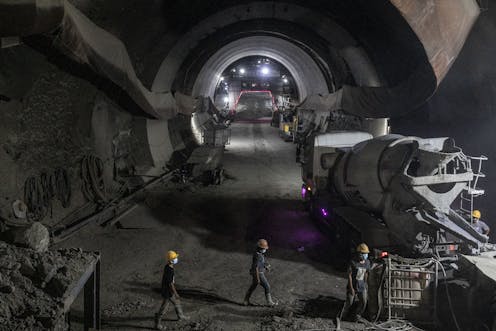
The Jakarta-Bandung High-Speed Train (KCJB) has become the most-awaited mega project worth US$8 billion in Indonesia. The 142-kilometre rail line connecting the Indonesian capital Jakarta with Bandung, the capital of West Java province, is currently under construction and the project aims to start operating in June 2023.
The KCJB project not only will be the first high-speed railway in Southeast Asia but is also set to become China’s most important Belt and Road Initiative project in Indonesia, if not Southeast Asia.
Handled by PT Kereta Cepat Indonesia-China (KCIC), the train will be able to travel at up to 350km per hour, cutting the journey time between Jakarta and Bandung from almost four hours to just 40 minutes.
But besides suffering financial issues, the project has also been criticised for delays, cost overruns, potential debt-traps and environmental destruction.
Alongside this, Indonesian think thank The Habibie Center has reported that the design and planning stages of the KCJB project has paid little attention to the needs and necessity of people with disabilities.
This has raised a hesitation of whether the KCJB train will accommodate the needs of people with disabilities when travelling between the Indonesia’s two largest cities.
KCIC involves less participation from disability groups, report says
The report released in September 2021 by the Habibie Center has found that PT KCIC has not been seen to involve groups of persons with disabilities in the design, planning and development stages as they are being delegated to non-disabled persons.
The report mentioned the company only have asked for inputs regarding the KCJB construction from disabled employees who work at the Ministry of Transportation. But it did not try to seek direct opinions from any disability community.
The report has led to a question of whether the disabled people will be able to enjoy the KCJB or not.
We should not deny that the train has adopted a good, sophisticated design, but some adjustments may still needed to make them suitable for the Indonesian people and to make it able to be implemented to Indonesia’s infrastructure conditions.
The Conversation Indonesia has reached out to KCIC but did not receive responses.
A PT KCIC spokesperson told the media the company has always followed Indonesia’s regulations about the construction of public infrastructure, which had also accommodated the need of people with disabilities.
What has the project promised so far?
PT KCIC has claimed the KCJB train will later provide facilities for people with disability.
The company has promised to build special train cars for “passengers with reduced mobility”, along with a range of supporting facilities.
Under the plan, each train would feature one special car with improved disability access and a wheelchair storage area. There would also be four special priority seats on every other car.
PT KCIC has also promised to design a special toilet for wheelchair users, equipped with Braille signage and sliding doors for ease of access.
The design of the special train car is adapted from the Indonesia’s Ministry of Transportation Regulation No. 63/2019 about the Minimum Service Standards for Public Train, and China’s Code Standard on railway regulations which also regulate the aspects for disability passengers.
Other supporting infrastructure for disabled passengers would include special escalators and elevators, special officers, priority ticketing facilities through e-ticketing applications and counters and parking spaces.
A reminder for Indonesian government
Persons with disabilities are facing their own unresolved challenges in Indonesia.
They are still very rarely involved in the development and operational stages of public transportation in Indonesia.
But we may hope better things with the involvement of foreign investments.
Indonesia has to impose firm and more comprehensive policies and regulations related to access and services for persons with disabilities, and those have to be enforced consistently in foreign investments.
The regulations need to be stated clearly on laws, government regulations, ministerial regulations and regional regulations.
The country also needs to make sure that all stakeholders in such investments must adopt inclusiveness and prioritise the rights of the persons with disabilities.
The government should initiate and ask the foreign investors to together involve civil society groups that concern with the disabled in the development planning of all projects related to public transport and facilities.
Yeta Purnama, a student from Universitas Islam Indonesia, contributed to this article.
Muhammad Zulfikar Rakhmat does not work for, consult, own shares in or receive funding from any company or organization that would benefit from this article, and has disclosed no relevant affiliations beyond their academic appointment.
This article was originally published on The Conversation. Read the original article.







